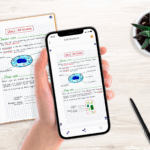
Memorising: 5 tips for retaining key information from your course
Memorising: 5 tips for retaining key information from your course
Memorising your lessons
Having trouble remembering what you've learned? Don't worry! In this article, we’re going to give you 5 tips to help you remember the most important information in your lesson!
Your exams are coming up and you’re having trouble remembering your lessons? Maybe you’re not using the right methods! We’ve put together a list of 5 tips to help you remember the most important information in your lesson.
Tip No. 1: Create revision notes
If you want to memorise your lesson effectively, you will (almost) inevitably have to write revision notes. These will help you to summarise the essential information from a lesson or a concept. In this way, you can clarify concepts and identify the key points to remember.
By reducing the content of your course to a few revision sheets, you also make it easier to digest and memorise. You keep only the essentials! We advise you to keep your revision notes up to date so that you don’t find yourself out of your depth as exam day approaches. You’ll be all the more confident on the big day!
To take your revision notes with you wherever you go, you can use the scribzee app! All you have to do is scan them in and then you can revise whenever and wherever you like, while keeping track of your progress.
Tip No. 2: Practise spaced repetition
To remember your lessons well, opt for spaced repetition. The principle is simple: your memories gradually deteriorate over time and our memory selects what we don’t need immediately in everyday life. Instead of revising intensively all at once, spread your revision sessions over several days or weeks. Regular reminders enable you to retain 80% of what you learnt 6 months earlier!
As you go along, increase the time between your revision sessions. In the end, you only need to revise the concepts you haven’t mastered completely! This technique is particularly effective for consolidating long-term memory.
There’s no better way to set yourself reminders than with the scribzee app! Thanks to the Leitner algorithm, which applies the principle of spaced repetition, you don’t need to worry. Depending on your level of each flashcard, the app suggests which ones you should review first.
Tip No. 3: Use visualisation techniques
Visual memory is a component of human memory whose function is to retain and process visual information. By using visualisation techniques, information is anchored in long-term memory! So, it’s a great way to remember your lesson. You can put this tip into practice by drawing:
- diagrams.
- pencil sketches.
- images.
- mind maps.
Flashcards are also a good visual way of retaining key information from your lesson. The principle is simple: you write your question on one side and the answer on the other. It’s a fun, visual way of revising important concepts!
Tip No. 4: Teach your lessons
Once you know your course and have revised the concepts sufficiently, you can in turn teach what you have learnt. In fact, explaining the concept to a friend or reciting your lesson to one of your parents allows you to revise in an active way. You go beyond simply rereading your notes, which can be a passive approach to learning. The act of teaching, of explaining, requires you to fully understand your subject.
By teaching someone else, you can identify gaps in your own understanding of the subject. Any questions or feedback from the person you’re with may also prompt you to reflect on aspects that you hadn’t yet fully understood. So, this is a very good indicator of where you stand in terms of learning the course.
You and your classmates can each try your hand at the exercise. That way, you’ll also have other ways of understanding your lesson, which might make it more meaningful to you!
Tip No. 5: reread your notes before going to bed
And last but not least: reread your notes before going to bed! This little trick is ideal for retaining information. When you’re asleep, your brain is better able to assimilate the information you’ve learned during the day. It is also during the deep slow wave sleep phase that memory and knowledge are consolidated.
What’s more, in the evening you’re exposed to less agitation and stress than during the day. So it’s the perfect time to reread your revision notes in peace. The scribzee app lets you have them at your fingertips, without moving a finger (or almost)! Remember to turn off all screens at least 1 hour before going to bed to help you get a good night’s sleep.
Working on your memory also involves...
To work on your memory, you need to do more than just make revision notes and diagrams. Memory also involves essential health aspects!
Maintaining a healthy, balanced diet is essential to nourish the brain and support its cognitive functions, including memory. Foods rich in antioxidants, omega-3 fatty acids, vitamins and minerals are particularly beneficial. So, go for fruit, fish and dairy products!
Quality sleep will also help you consolidate your memories and regenerate your brain. Adequate sleep and complete sleep cycles are essential for optimal memory.
Finally, regular physical activity increases blood flow to the brain, stimulates the release of beneficial chemicals and encourages the growth of new brain cells. Sport is good for the overall health of your brain, so don’t hesitate to put your trainers on for a jog between revision sessions!
As you’ll have realised, the best way to remember your lessons is to vary your methods and revise regularly. It’s up to you to find what works best for you! So, are you ready to get started today?




Your email address will not be published.